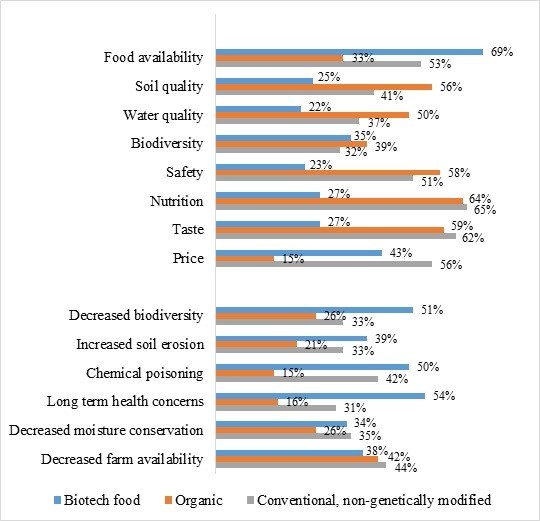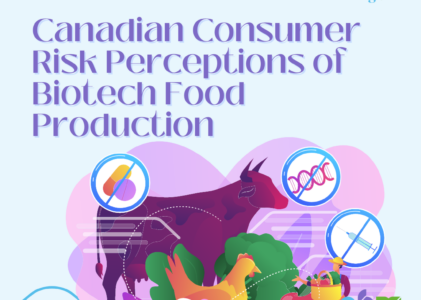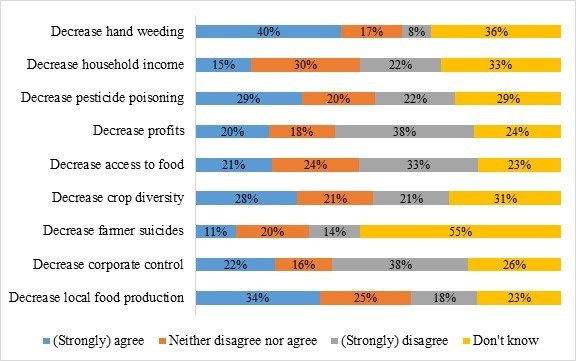When it comes to food production methods, the risks and benefits matter
Studies on consumer awareness and knowledge, specifically on how crops and foods are grown and produced, have shown that the vast majority of Canadian consumers self-identify as having limited knowledge or awareness. On the positive side, in the 2020 Canadian Centre for Food Integrity research report, a majority of those saying they have little knowledge and awareness want to learn more. We also cannot put the responsibility of gaining awareness of food solely on the consumer, as an industry we need to learn how they perceive food, their risks, and what concerns them. Understanding how consumers view and perceive food products is a huge industry sector, with food processing firms spending significant amounts of money annually to better understand consumers. To gain insights into how consumers view benefits and risks, we undertook a survey of 502 Canadians back in 2018 with the help of our summer student, Claire Williams.
Familiarity with biotechnology in our foods
The survey focused on learning what benefits and risks consumers associated with different food production techniques. We wanted to know how familiar consumers were about crop production, as they can often have strong opinions regarding organic food, conventional food and food developed by modern biotechnology, so we used these terms in our survey. Of our sample across Canada, 24% of respondents indicated they were not at all familiar or were unsure of their degree of familiarity with agricultural biotechnology. Familiarity of biotechnology had a strong correlation to gender, age, and level of education, and a weaker but significant correlation for province/territory. Females indicated they were less familiar than males, older respondents were more familiar than younger and the higher the level of education, the greater the familiarity. Those living in the Western Canadian provinces of British Columbia, Alberta, Saskatchewan and Manitoba expressed greater familiarity. When food label information was scarce, respondents were asked what they believed the physical differences between biotech and non-biotech foods were. Those in the agriculture industry will know that the difference is often agronomic, such as higher yields or resistance to chemicals and that on a food quality and nutrition level all products are identical, consumers thought otherwise. Nearly half, 49% of participants associated increased physical food size with GM food and 36% with visual quality.
To better assess the level of knowledge that consumers possess about the production of biotech food products, they were specifically asked whether this form of production could affect specific aspects (Figure 1). In numerous aspects, a significant number of respondents identified that they ‘Don’t Know’ when asked “do you think the production of biotech foods results in a decrease in…?”. Evidence has confirmed that biotech crops decrease the need for hand weeding, pesticide poisoning, farmer suicide and corporate control. Biotech crops increase household income, profits, access to food, crop diversity and local food production. Aspects that relate to reduced income or profitability were correctly disagreed with, as biotech crops have been shown to substantially increase household incomes and farm profits. Biotech crops are proven to increase yields and the supply of food, yet one-third of respondents indicated they believed biotech crops reduce local food production. These results indicate that in the best response scenario, 40% of respondents knew the correct effect from biotech crops, with 11% being the low end. While these results are a disappointment, it’s not a surprise, given the disconnect between the public and farmers. The majority of Canadians are not aware of the economic, environmental and social benefits provided by biotech crops.
But what’s the consumers perspective and views when it comes to biotech food?
While consumer knowledge is important, the food and agricultural industry need to know what information can help address consumer understanding and viewpoints of food. In an effort to try and do this, we asked a set of six questions that required respondents to provide their perspectives on a list of factors for biotech foods, organic foods and conventional non-genetically modified foods. Figure 2 illustrates the combined presentation of these responses of consumers’ opinions.

Consumer opinions, perspectives and views on food and its production do not necessarily reflect what is occurring. For instance, we know from risk assessment and production data that there is no difference in the safety or nutritional value of food products, regardless of the method used to produce the product. Respondents, however, strongly believed that organic and non-GM foods are safe, have higher nutrition and would not have long-term health effects. Whereas in the responses to biotech foods only one-quarter felt they were safe and nutritious, and 54% felt there were long-term health concerns, when in fact these foods are equal in all these aspects to similar foods from organic and conventional production. Another factor that was not well understood was concerning the sustainability of biotech food production. Biotech food production has significantly reduced the need for soil tillage, a common requirement for organic agriculture and respondents also felt that biotech crops were less likely to improve soil quality, while biotech crops are the leading reason for improved soil quality.
We need to work to improve the knowledge and opinion of biotech food
While the results of our survey indicate consumers are not as well informed about many aspects of food production methods as those in the agriculture and food industries would like. Yet it also highlights to the agricultural and food industries where communication efforts should be best focused. Consumers are interested in learning more about how their food products are produced and are seeking information that assists them in gaining better knowledge and understanding. Clearly, as an industry, we need to make more inroads to helping offer this information clearly and without bias, especially within biotech. Providing this information in an accessible format will contribute to consumers have improved knowledge and understanding the benefits of biotech crops and food production. The goal doesn’t necessarily need to be to gain everyone’s support of biotech foods, but having an understanding of the facts is the first step in helping to gain the opinions and positive perspectives of consumers.



